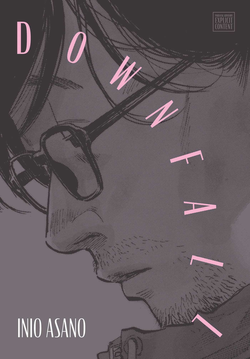
Kaoru Fukusawa is a mangaka. His life is manga. His heart is manga. His soul is manga. And through the medium of manga, he is moderately successful. One day after finishing his first series he gets Writer's Block. He can't continue to make manga—he has no idea what to write about. And as his life falls apart around him, Fukusawa is pressured more and more to make that "one hit" that will save his career.
This manga provides examples of:
- Ambiguous Ending: The final chapter can be interpreted in numerous ways. Either Fukuzawa has given up on making real art to make a successful commercial product and is caught off guard by how his art can still positively affect people when he interacts with a fan of his, or Fukusawa is moved to tears because he's realized that the "worthless art" that made him successful is the only thing that allows him to connect with others.
- Chekhov's Gunman: Akari, the one fan who Fukusawa talks with on Twitter, ends up coming to his book signing in the last chapter.
- Classical Anti-Hero: Fukusawa is not a good person. He's crude, callous, self-absorbed, abusive to his wife and ultimately a Manipulative Bastard who isn't above engaging in toxic relationships with his fanbase or his friends. It's also made clear that Fukusawa is deeply depressed and that his self-destructive nature is slowly killing him, but how sympathetic that makes him to the audience is up to interpretation especially in light of his more heinous acts, like forcing his ex-wife to have sex with him.
- Deconstruction: The book is a harsh look at the realities of living in the manga industry, and how social media like Twitter are able to create toxic parasocial relationships between author and fan. As well, the book asks many questions about the relationship between fan and author, and questions the assumption that audiences have about authors intrinsically being good people just because they make engaging art.
- Does This Remind You of Anything?: Fukusawa is almost certainly meant to be an embodiment of Inio Asano himself. Not only does Fukusawa look like him, but Asano's real life office space is a dead ringer for Fukusawa's. When Fukusawa was younger, he used to have dyed blonde hair just like Asano does right now. To bridge the gap even further, according to interviews "Fukusawa" is the name Asano went under when he engaged in prostitution so people wouldn't recognize him. What this overlap means is unclear, but the story is on some level an attempt by Asano to vent his feelings towards the manga industry. Whether or not Fukusawa is Asano is unclear.
- Jerkass: Fukusawa. A flashback during the last chapter shows he wasn't always this way, but the realities of the manga industry and his elitist colleagues turned him into a cruel asshole. The last shot of the manga is a flashback to him reacting to one of his ex-girlfriends calling him a monster for his obsession with manga over the feelings of those around him. Notably, the dejected stare he makes is the exact same facial expression he's had throughout the rest of the series.
- Love Hotels: Fukusawa's wife spends a lot of time working with a hot up-and-coming mangaka, so he frequents love hotels to alleviate his sexual frustration, requesting that the workers dress like schoolgirls to reflect his fanbase. He eventually becomes a regular customer of a worker whose cat-like eyes remind him of his ex-girlfriend from the start of the story.
- Rape as Drama:
- One of Fukusawa's artists tries to get him to admit that he harassed her, and then threatens to sue him when he refuses, although she ends up not following through. Said harassment, though, seems to consist of her hating being stuck in a small studio with a smoker and having to hear what happens in the bathroom; it's unrevealed if anything else happened.
- Later in the story, a bitter argument between Fukusawa and his ex-wife leads to him snapping and trying to rape her, but he can't actually do the deed. She relents and they have sex later, but it only leads to one last argument that completely destroys the remnants of their relationship.
- Writer's Block: Fukusawa finds himself completely out of ideas after Goodbye Sunset ends. His inability to come up with something, and the associated blowback on social media and from editors, feeds into his depression and disdain for the industry.
